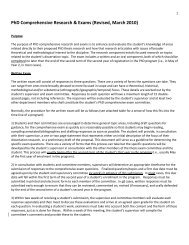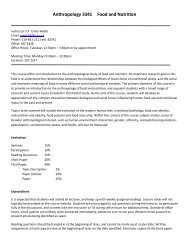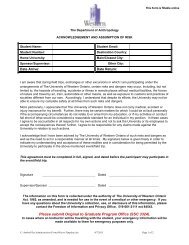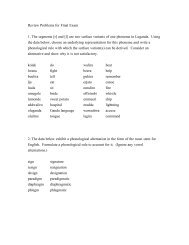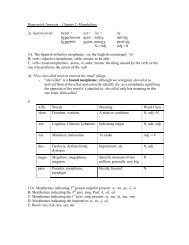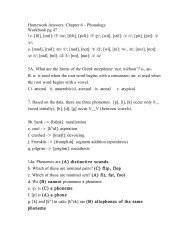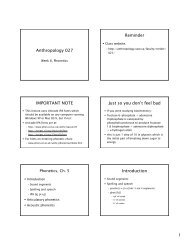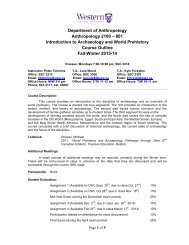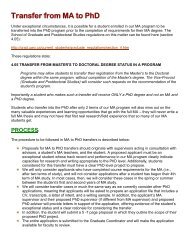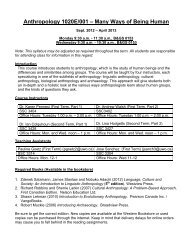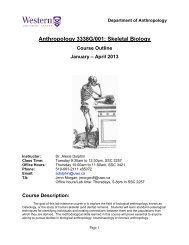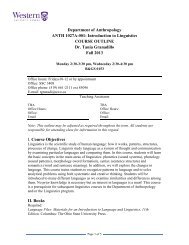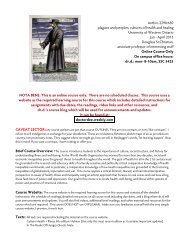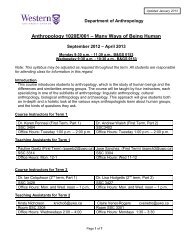DEPARTMENT OF ANTHROPOLOGY ANTHROPOLOGY 1020E ...
DEPARTMENT OF ANTHROPOLOGY ANTHROPOLOGY 1020E ...
DEPARTMENT OF ANTHROPOLOGY ANTHROPOLOGY 1020E ...
Create successful ePaper yourself
Turn your PDF publications into a flip-book with our unique Google optimized e-Paper software.
<strong>DEPARTMENT</strong> <strong>OF</strong> <strong>ANTHROPOLOGY</strong><br />
<strong>ANTHROPOLOGY</strong> <strong>1020E</strong>/004<br />
MANY WAYS <strong>OF</strong> BEING HUMAN<br />
September 2012-April 2013<br />
This course introduces students to anthropology, which is the study of human beings<br />
and the differences and similarities among groups. The course will be taught by three<br />
instructors, each specializing in one of the subfields of anthropology: linguistic<br />
anthropology, cultural anthropology, biological anthropology and archaeology. This<br />
approach will give students both an in-depth and a holistic look at the various ways<br />
anthropologists learn about human groups, and the kinds of questions they ask.<br />
TIME: Tuesday 2:30 – 3:30; Thursday 2:30 – 4:30<br />
PLACE: SEB 2200<br />
INSTRUCTORS:<br />
Dr. Sherrie Larkin<br />
Dr. Karen Pennesi<br />
(Sociocultural Anthropology)<br />
(Linguistic Anthropology)<br />
Office: SSC 3328 Office: SSC 3404<br />
E-mail: slarkin@uwo.ca E-mail: pennesi@uwo.ca<br />
Hours: Tuesday 1:00 – 2:00 Hours: Tuesday 1:00 – 2:00<br />
Dr. Alexis Dolphin (Biological Anthropology and Archaeology)<br />
Office: SSC 3421<br />
E-mail: adolphin@uwo.ca<br />
Hours: Thursday 11:00 – 12:00<br />
TEACHING ASSISTANTS (second term)<br />
Colleen Haukaas chaukaas@uwo.ca Hours: Tues 10:00-12:00 Office: 3304<br />
Mingyuan Zhang mzhan227@uwo.ca Hours: Wed 12:00 – 1:00 Office: 3312<br />
BOOKS TO PURCHASE:<br />
Richard Robbins & Sherrie Larkin. 2007. Cultural Anthropology: A Problem-Based<br />
Approach, Canadian Edition.<br />
Zdenek Salzmann, James Stanlaw, & Nobuko Adachi. 2012. Language, Culture and Society:<br />
An Introduction to Linguistic Anthropology (5 th Edition).<br />
Barry Lewis, Robert Jurmain, and Lynn Kilgore. 2013. Understanding Humans: Introduction<br />
to Physical Anthropology and Archaeology. 11th edition. Toronto: Wadsworth/ Thomson<br />
Be sure to purchase the correct editions. Both new and used copies of some texts are<br />
available at the Western Bookstore. If you decide to purchase your texts through the
internet, keep in mind that delivery delays for online orders may cause you to fall behind in<br />
the reading assignments.<br />
MARKS WILL BE CALCULATED AS FOLLOWS:<br />
Discussion Papers (2 at 5% each) Sept 25 & Oct 18 10%<br />
Language Autobiography Nov 27 10%<br />
December Exam TBA 30%<br />
Spring Term Test Feb 28 15%<br />
Essay Mar 21 20%<br />
April Exam TBA 15%<br />
WEB SITE:<br />
We have a web site for this class. The address is https://owl.uwo.ca. This site includes the<br />
course outline, study guides or overheads used in lecture, class announcements, and a<br />
“Grade Book” that contains your marks for each assignment.<br />
WRITTEN ASSIGNMENTS:<br />
This is an essay course and it requires that you write at least 3,000 words in order to<br />
successfully complete the course. If you do not complete your written assignments, you<br />
will fail the course, regardless of your exam marks.<br />
All assignments must be submitted BOTH electronically, through OWL, and as a hard copy<br />
in class. Your assignments will not be considered complete until BOTH the electronic copy<br />
and the paper copy have been received. If you are unable to submit your assignment in<br />
class, you may leave it in the drop box outside the Anthropology Main Office (SSC 3326).<br />
The drop box is emptied each morning and stamped with the previous day’s date. Do NOT<br />
submit assignments as e-mail attachments or by sliding them under the professor’s door.<br />
These will be discarded unread. Late assignments will be penalized 5% per weekday unless<br />
you provide documentation from Academic Counselling to justify an extension.<br />
Missed Deadlines<br />
Occasionally illness or other personal issues make it impossible to meet deadlines. In such<br />
cases adequate documentation must be submitted to Academic Counselling of your home<br />
faculty, according to the terms of the Senate policy regarding medical accommodation as<br />
specified at: http://www.uwo.ca/univsec/handbook/appeals/accommodation_medical.pdf.<br />
Providing such documentation is accepted by Academic Counselling, reasonable effort will be<br />
made to accommodate your situation. Without this, no accommodations will be made.<br />
Format of Assignments<br />
All written assignments must be typed, double-spaced, 12 point font, with 2.5 cm (1 inch)<br />
margins, and stapled (staplers can be purchased for less than $2 and will be useful for the<br />
rest of your academic career). You may print double-sided. Number all pages except the cover<br />
page, if there is one. The title page must have your name, the professor's name, the course
number and the assignment title. Follow the guidelines of the American Anthropological<br />
Association (http://www.aaanet.org/publications/style_guide.pdf) for proper citation of<br />
references within the essay and in the bibliography. Points will be deducted if your assignment<br />
does not meet these requirements.<br />
Note: Additional instructions for each written assignment will be provided in class or<br />
on OWL.<br />
Discussion Papers for Sociocultural Anthropology (Due Sept.25 and Oct. 18)<br />
During the semester, you will write two short papers (about 2-3 pages each) in which you<br />
discuss some aspect of the material that has been covered in class or in the text. Each<br />
paper should be between two and three pages in length. This is your chance to elaborate on<br />
the issues that you find interesting. Each discussion paper is worth 5% of your total mark<br />
for the course.<br />
Assignment for Linguistic Anthropology (due Nov. 27)<br />
Write a language autobiography in 1000 words, reflecting on your experiences learning and<br />
using language(s) in relation to the concepts and issues we have studied in the course. The<br />
assignment is designed to get you to think about the variety of linguistic experiences and<br />
competencies individuals have and how language is connected to many other aspects of life.<br />
In particular, you should consider how culture, social structure, institutions and power<br />
relationships affect language choices and practices. This assignment is worth 10% of your<br />
total mark for the course.<br />
Essay for Biological Anthropology and Archaeology (Due Mar. 21)<br />
Students are required to submit an essay that pertains to a topic of importance to<br />
biological anthropology and/or archaeology. This 8-page essay will utilize at least 8 sources<br />
that you have sought out independently. Some details regarding potential topics for the<br />
final paper will be posted on our course website during the first few weeks of class, while<br />
further tips regarding formatting and style guidelines will be distributed later in the<br />
semester. It is strongly recommended that you approve your topic with the instructor or a<br />
teaching assistant as early as possible, and certainly before getting to the writing stage.<br />
This essay is worth 20% of your total mark for the course.<br />
VIDEOS:<br />
We will see several videos throughout the course. They will be treated the same as<br />
lectures, so don’t miss them.<br />
DECEMBER EXAM<br />
The date for the December exam will be announced when the time and place become<br />
available through the Registrar’s Office. The material covered in the December exam will<br />
be limited to Linguistic Anthropology and Sociocultural Anthropology. The format of the<br />
exam will be multiple choice and short answer questions.
APRIL EXAM<br />
The date for the April exam will be announced when the time and place become available<br />
through the Registrar’s Office. The material covered in the December exam will be limited<br />
to Biological Anthropology and Archaeology.<br />
OTHER COURSE INFORMATION:<br />
No electronic devices will be allowed in the classroom during tests and examinations.<br />
“Plagiarism: Students must write their essays and assignments in their own words.<br />
Whenever students take an idea, or a passage from another author, they must<br />
acknowledge their debt both by using quotation marks where appropriate and by proper<br />
referencing such as footnotes or citations. Plagiarism is a major academic offence (see<br />
Scholastic Offence Policy in the Western Academic Calendar). All required papers may be<br />
subject to submission for textual similarity review to the commercial plagiarism detection<br />
software under license to the University for the detection of plagiarism. All papers<br />
submitted will be included as source documents in the reference database for the purpose<br />
of detecting plagiarism of papers subsequently submitted to the system. Use of the<br />
service is subject to the licensing agreement currently between the University of Western<br />
Ontario and Turnitin.com” (http://www.turnitin.com).<br />
“Scholastic offences are taken seriously and students are directed to read the<br />
appropriate policy, specifically, the definition of what constitutes a Scholastic Offence, at<br />
the following Web site: http://www.uwo.ca/univsec/handbook/appeals/scholoff.pdf”<br />
LAPTOPS:<br />
You are welcome to bring your laptop to class for the purpose of taking notes, and only for<br />
that purpose. If it becomes obvious that you are using your laptop for some other purpose,<br />
you will no longer be allowed to have it in the classroom. All other electronic devises must<br />
be turned off during class.<br />
OUTLINE <strong>OF</strong> TOPICS AND READINGS<br />
How will the course work? How can students succeed?<br />
Sept. 6 What is anthropology? What is Culture?<br />
Required Reading: Robbins & Larkin, Chapter 1<br />
How do we study culture? What is an ethnography?<br />
Sept 11 Anthropological fieldwork and writing.<br />
Sept 13 Video: Off the Veranda<br />
What is Progress? What is Economic ‘Development’?<br />
Sept 18 Is economic development progress ?<br />
Sept 20 How do people make their living?<br />
Video: Ongka’s Big Moka<br />
Required Reading: Robbins & Larkin, Chapter 2
How do we write an essay in Anthropology?<br />
Sept 25 Guidelines for ‘Writing Anthropology’<br />
What is Kinship?<br />
Sept 27 How does kinship work? Why isn’t kinship the same everywhere?<br />
Required Reading: Robbins & Larkin, Chapter 5<br />
How is social inequality created?<br />
Oct 2 Are some people just better than others?<br />
Required Reading: Robbins & Larkin, Chapter 7<br />
How do we form our identity?<br />
Oct 4 How do we know who we are?<br />
Required Reading: Robbins & Larkin, Chapter 6<br />
How do we define and understand our world?<br />
Oct 9 Why are symbols important in understanding our world?<br />
Oct 11 What is a worldview and what happens when our world changes?<br />
Required Reading: Robbins & Larkin, Chapter 4<br />
What is a Nation-State?<br />
Oct 16 Violence and the nation-state<br />
Oct 18 Video: Bitter Paradise: Sellout of East Timor<br />
Required Readings: Robbins & Larkin, Chapter 3 and Chapter 8<br />
What is linguistic anthropology?<br />
Oct 23 anthropology; linguistics; linguistic anthropology; methods<br />
Required Readings: Salzmann, Stanlaw, Adachi Ch. 1, 2<br />
What is unique about human language?<br />
Oct. 25<br />
development of language; design features; nonverbal communication<br />
Required Readings: Salzmann, Stanlaw, Adachi Ch. 5, 6<br />
Oct. 30<br />
language acquisition; multilingualism<br />
Required Reading: Salzmann, Stanlaw, Adachi Ch. 7<br />
How and why do languages change?<br />
Nov. 1 sound systems; word structure; meaning; sentence structure<br />
Required Readings: Salzmann, Stanlaw, Adachi Ch. 3, 4<br />
Nov. 6<br />
processes of language change; reconstruction of languages<br />
Required Reading: Salzmann, Stanlaw, Adachi Ch. 8<br />
How is language used to accomplish social goals?<br />
Nov. 8 dialects; styles; pidgins and creoles; ethnography of communication<br />
Required Readings: Salzmann, Stanlaw, Adachi Ch. 9, 10<br />
Nov. 13<br />
verbal art; performance and performativity
How do we use language to divide and unite people?<br />
Nov. 15 linguistic ideology<br />
Required Reading: Salzmann, Stanlaw, Adachi Ch. 13<br />
Nov. 20<br />
Nov. 22<br />
indexicality; identity; gender; race; ethnicity<br />
standard and non-standard language<br />
How does language affect the way we think?<br />
Nov. 27 linguistic relativity; colours and kinship<br />
Required Reading: Salzmann, Stanlaw, Adachi Ch. 12<br />
Assignment 2 due<br />
How can we apply linguistic anthropology?<br />
Nov. 29 language planning; language revitalization; translation; law; ethics<br />
Required Reading: Salzmann, Stanlaw, Adachi Ch. 14<br />
Review for midterm exam<br />
Dec. 4<br />
main ideas; concepts; types of exam questions<br />
Second Term:<br />
DATE TOPIC READINGS<br />
Jan 8 & 10 What is biological anthropology and anthropological archaeology? Chapter 1<br />
Jan 15 & 17 Biological Anthropology: historical background & evolutionary theory Chapters 2, 3<br />
Jan 22 & 24 Anthropological Archaeology: historical background & methods Chapter 8<br />
Jan 29 & 31 The Living Primates Chapters 5, 6 & 7<br />
Feb 5 & 7 Primate and Hominin Origins Chapter 9<br />
Feb 12 & 14 The Genus Homo & Neandertals Chapter 10 & 11<br />
Feb 19 & 21 READING WEEK (NO CLASSES) -<br />
Feb 26 & 28 Exam Review/Tips (Tues) & MID-TERM EXAM (Thurs, in-class) -<br />
Mar 5 & 7 Modern Human Origins & The Upper Paleolithic Chapter 12<br />
Mar 12 & 14 Human Variation and Adaptation Chapter 4<br />
Mar 19 & 21<br />
Peopling of the New World and Repatriation Issues<br />
FINAL PAPER DUE (Thurs, in-class)<br />
Chapter 13<br />
Mar 26 & 28 Origins of Domestication & Agriculture Chapter 14<br />
Apr 2 & 4 Development of State-Level Societies Chapter 15<br />
Apr 9 & 11 Biocultural Evolution & Exam Review Chapter 16



